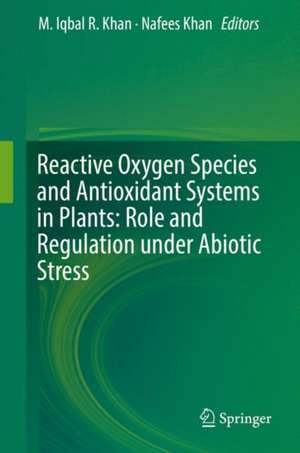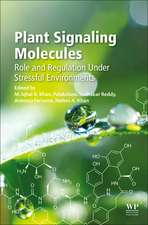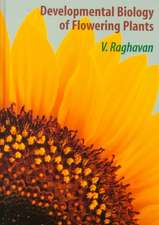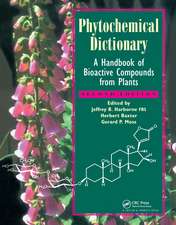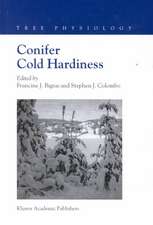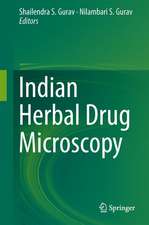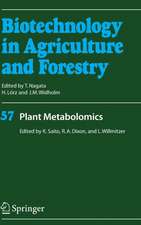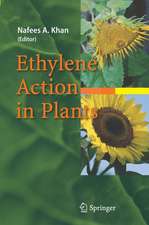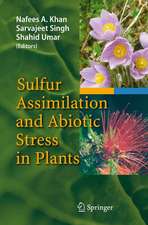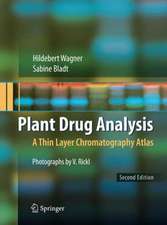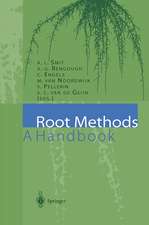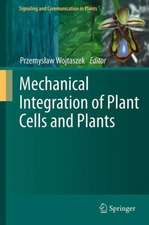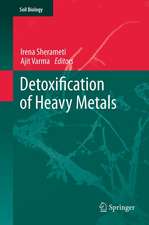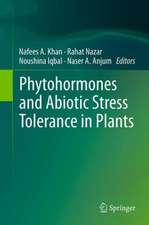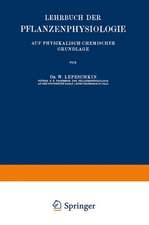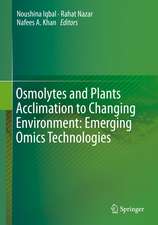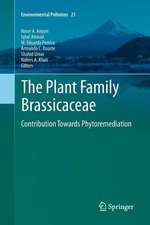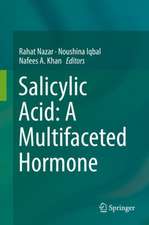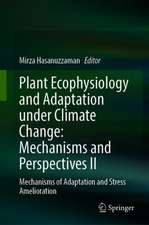Reactive Oxygen Species and Antioxidant Systems in Plants: Role and Regulation under Abiotic Stress
Editat de M. Iqbal R. Khan, Nafees A. Khanen Limba Engleză Hardback – 9 aug 2017
The present edited book is an attempt to update the state of art of the knowledge on metabolism of ROS and antioxidants and their relationship in plant adaptation to abiotic stresses involving physiological, biochemical and molecular processes. The chapters are much focused on the current climate issues and how ROS metabolism can manipulate with antioxidant system to accelerate detoxification mechanism. It will enhance the mechanistic understanding on ROS and antioxidants system and will pave the path for agricultural scientists in developing tolerant crops to achieve sustainability under the changing environmental conditions.
| Toate formatele și edițiile | Preț | Express |
|---|---|---|
| Paperback (1) | 946.72 lei 6-8 săpt. | |
| Springer Nature Singapore – 12 dec 2018 | 946.72 lei 6-8 săpt. | |
| Hardback (1) | 952.89 lei 6-8 săpt. | |
| Springer Nature Singapore – 9 aug 2017 | 952.89 lei 6-8 săpt. |
Preț: 952.89 lei
Preț vechi: 1162.06 lei
-18% Nou
Puncte Express: 1429
Preț estimativ în valută:
182.36€ • 198.01$ • 153.18£
182.36€ • 198.01$ • 153.18£
Carte tipărită la comandă
Livrare economică 22 aprilie-06 mai
Preluare comenzi: 021 569.72.76
Specificații
ISBN-13: 9789811052538
ISBN-10: 9811052530
Pagini: 355
Ilustrații: XIII, 329 p. 20 illus., 15 illus. in color.
Dimensiuni: 155 x 235 mm
Greutate: 0.66 kg
Ediția:1st ed. 2017
Editura: Springer Nature Singapore
Colecția Springer
Locul publicării:Singapore, Singapore
ISBN-10: 9811052530
Pagini: 355
Ilustrații: XIII, 329 p. 20 illus., 15 illus. in color.
Dimensiuni: 155 x 235 mm
Greutate: 0.66 kg
Ediția:1st ed. 2017
Editura: Springer Nature Singapore
Colecția Springer
Locul publicării:Singapore, Singapore
Cuprins
1. An introduction to Antioxidants and Their Roles in Plant Tolerance.- 2. An Introduction to Reactive Oxygen Species Metabolism Under Changing Climate in Plants.- 3. Biotechnological Perspective of Reactive Oxygen Species (ROS) Mediated Stress Tolerance In Plants.- 4. ROS Compartmentalization in Plant Cells under Abiotic Stress Conditions.- 5. Reactive Oxygen Species Production and Detoxification during Leaf Senescence.- 6. ROS-induced Transcription Factors during Oxidative stress in Plants: A Tabulated Review.- 7. ROS-induced Signaling and Gene-expression in Crops Under Salinity Stress.- 8. ROS Signaling in Plants under Heavy Metal Stress.- 9. Effects of Different Metal Stresses on the Antioxidant Defence Systems of Medicinal Plants.- 10. Responses, Adaptation and ROS Metabolism in Plants Exposed to Waterlogging Stress.- 11. Role of Reactive Oxygen Species in Water Deficit Stress Response.- 12. Contribution of Glutathione in
Heavy Metal Stress Tolerance in Plants.- 13.Production of Antioxidant and Oxidant Metabolites in Tomato Plants Infected with Verticillium dahliae Under Saline Conditions.Notă biografică
Dr. M. Iqbal R. Khan is a post-doctoral fellow at International Rice Research Institute, Philippines. He completed his BSc, MSc and PhD from Department of Botany, Aligarh Muslim University. His current research interests are elucidation mechanisms involves in flooding tolerance and looking for any additional donor for breeding purpose. He has published over 35 peer-reviewed research articles, contributed 6 book chapters to various book editions published by Springer, CABI etc. He has been awarded by various research fellowships during PhD and post PhD tenure such as, UGC-MANF, DBT-RA, SERB-DST Young scientist, SERB-NPDF and IRRI-PDF. He has been awarded by Young Scientist of the Year Award 2014 from Scientific and Environmental Research Institute, India.Professor Nafees A. Khan is working as plant physiologist at Department of Botany, Aligarh Muslim University, Aligarh, India. The current research interest of Prof. Khan is mainly on understanding the mechanisms of hor
monal and nutritional regulation of plant growth with special emphasis on abiotic stress vis-a-vis photosynthetic efficiency and abiotic stress tolerance. He has supervised 15 Ph.D. and 05 M.Phil. students and has edited 14 books, including this, published more than 170 peer-reviewed research articles in journals of international and national repute. He has won various prestigious awards. He is Vice President of the National Environmental Science Academy (NESA), India.
monal and nutritional regulation of plant growth with special emphasis on abiotic stress vis-a-vis photosynthetic efficiency and abiotic stress tolerance. He has supervised 15 Ph.D. and 05 M.Phil. students and has edited 14 books, including this, published more than 170 peer-reviewed research articles in journals of international and national repute. He has won various prestigious awards. He is Vice President of the National Environmental Science Academy (NESA), India.
Textul de pe ultima copertă
The present edited book is an attempt to update the state of art of the knowledge on metabolism of ROS and antioxidants and their relationship in plant adaptation to abiotic stresses involving physiological, biochemical and molecular processes. The chapters are much focused on the current climate issues and how ROS metabolism can manipulate with antioxidant system to accelerate detoxification mechanism. It will enhance the mechanistic understanding on ROS and antioxidants system and will pave the path for agricultural scientists in developing tolerant crops to achieve sustainability under the changing environmental conditions.
Caracteristici
Presents current research progress made in the niche area of reactive oxygen and nitrogen species signaling Elaborates on metabolism of ROS and antioxidants and their relationship in plant adaptation to abiotic stresses Emphasizes on the integral role of signaling molecules in the regulation of biological processes
